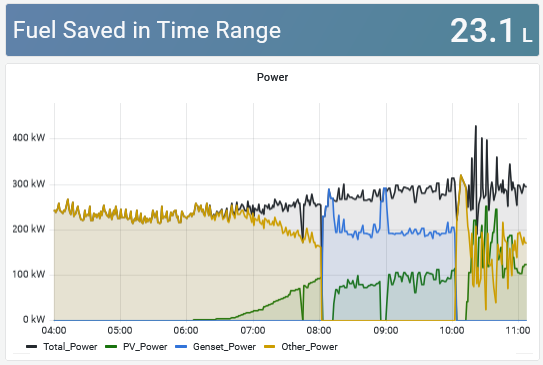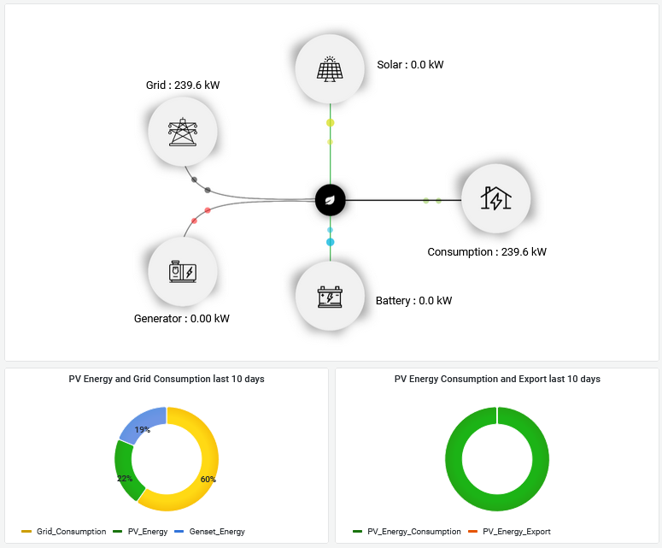RES Project South Africa
We are introducing the RES Project South Africa 2023. Find out more about our activities and goals in the field of remote monitoring, control and energy efficiency in South Africa on this page.
The RES-Programme - Background
German Energy Agency (dena)
The German Energy Agency (dena) is a centre of excellence for the applied energy transition and climate protection. dena studies the challenges of building a climate-neutral society and supports the German government in achieving its energy and climate policy objectives. Since its foundation in 2000, dena has worked to develop and implement solutions and bring together national and international partners from politics, industry, the scientific community and all parts of society. dena is a project enterprise and a public company owned by the German federal government. dena’s shareholder is the Federal Republic of Germany. www.dena.de
German Energy Solutions Initiative
With the aim of positioning German technologies and know-how worldwide, the German Energy Solutions Initiative of the Federal Ministry of Economics and Climate Action (BMWK) supports suppliers of climate-friendly energy solutions in opening up foreign markets. The focus lies on renewable energies, energy efficiency, smart grids and storage, as well as technologies such as power-to-gas and fuel cells. Aimed in particular at small and medium-sized enterprises, the German Energy Solutions Initiative supports participants through measures to prepare market entry as well as to prospect, develop and secure new markets. www.german-energy-solutions.de/GES/Navigation/EN/Home/home.html
Renewable Energy Solutions Programme (RES Programme)
With the RES programme, the German Energy Solutions Initiative of the Federal Ministry of Economics and Climate Action (BMWK) helps German companies in the renewable energy and energy efficiency sectors enter new markets. Within the framework of the programme, reference plants are installed and marketed with the support of the German Energy Agency (dena). Information and training activities help ensure a sustainable market entry and demonstrate the quality of climate-friendly technologies made in Germany. www.german-energy-solutions.de/GES/Redaktion/EN/Basepages/Services/dena-res.html
Why we are focusing on the South African energy market
EcoPhi Monitoring Solutions offer a diverse range of applications that can be utilized in various combinations and scenarios. The primary focus lies in applications within the Ongrid and Offgrid solar energy sectors, as well as solar pump systems.
The solar market in South Africa is experiencing rapid growth. Due to frequent planned and unplanned power outages, businesses and households are investing in solar installations with energy storage, generator-coupled solar systems, or standalone storage solutions. These installations act as a crucial bridge during power outages, ensuring uninterrupted power supply. Industries and businesses heavily depend on a continuous power supply, making these systems critical for their operations. Therefore, continuous monitoring and maintenance of these installations are of paramount importance. Additionally, various components are combined and connected to the power grid, requiring optimization during operation. Centralized control solutions are essential for this purpose.
EcoPhi Remote Monitoring and Control Solutions address these requirements comprehensively. The EcoPhi Monitoring and Control Systems consist of three distinct levels: hardware, cloud platform, and additional customer services.
In South Africa, numerous opportunities exist, particularly in addressing challenges like Load Shedding and integrating various components within a system, including solar panels, energy storage, and diesel generators.
Remote Monitoring, Control and Energy Management tailored to the South African energy market
Grid Limitation and Fuel Saving Mode
In this case in particular and in several countries in general, regulations prohibit feeding excess solar power back into the grid. This limitation presents a challenge for maximizing solar energy utilization while complying with local regulations.
The EcoPhi Pro Box addresses this issue reliably. It continuously monitors grid consumption and controls the inverters (both PV and battery) to limit grid consumption. This limitation is by default set to 0.0 kW but can be customized as per individual requirements, e.g. if maximum feed-in levels are set on a contractual base.
The Power Regulation feature in this case provides the ability to dynamically adjust solar power generation. When the PV power exceeds the demand, the system intelligently scales down the power generation to align with the consumption needs.
In order to reduce reliance on generators in the case of a power outage, the Fuel Saving Mode is automatically activated. In this mode, the EcoPhi Pro Box intelligently controls the inverters to ensure that the generators provide a specific percentage of needed power. This specific percentage is strategically set to balance efficiency and power needs and can be adjusted through the platform.
The EcoPhi Pro Box stands out in the case for its ability to integrate and optimize various components, including generators and inverters from different manufacturers within one system. This flexibility enhances overall system efficiency and adaptability.

Grid prices: Battery and grid optimization
The EcoPhi Pro Box system is designed to optimize energy usage in relation to grid pricing, leveraging the capabilities of battery storage and solar power to achieve cost-effective energy management.
Strategy During Low Grid Prices:
Battery Charging: When grid prices are low, the system prioritizes charging the battery inverters to their full capacity. The charging continues until a pre-set limit, which in this case is 70% State of Charge (SoC).
Grid Consumption Reduction: Upon reaching the 70% SoC limit, the EcoPhi Pro Box automatically reduces grid consumption to 0.0 kW. This is done without discharging the battery.
Utilization of unused PV Power: Any surplus power generated by the PV system, which is not needed for immediate consumption, is directed towards further charging the battery storage.
Strategy During High Grid Prices:
Utilizing PV System: During periods of high grid prices, the system’s first response is to use power from the PV system to minimize grid consumption.
Battery Power Utilization: Following the PV system, the battery power is then utilized to further reduce dependence on the grid.
The pricing scheme of the national energy grid is based on a 24 hour scheme that can be adjusted regularly. External data points can be implemented, so that the energy prices can automatically or manually be updated.
The EcoPhi Pro Box stands out in the case for its ability to integrate and optimize various components, including generators, inverters and batteries from different manufacturers. This flexibility enhances overall system efficiency and adaptability.

Supported by

